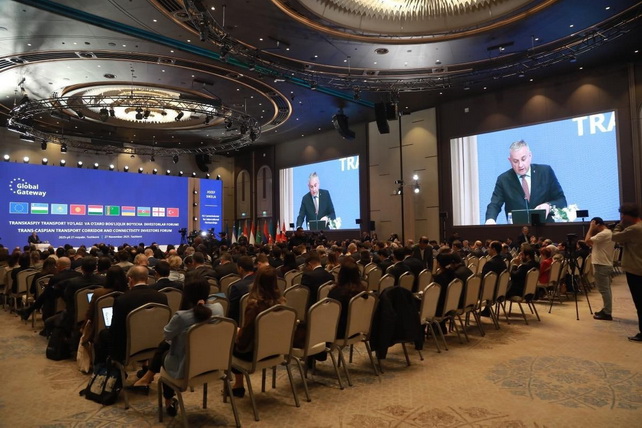
EU and Central Asian Countries Invest in Transport and Digitalization
EU and Central Asian Countries Invest in Transport and Digitalization
Tashkent, Uzbekistan (UzDaily.com) — The Trans-Caspian Transport Corridor (TCTC) and Investor Connectivity Forum highlighted strong political commitment from the European Union, South Caucasus and Central Asian countries, Turkey, international development banks, the private sector, and regional partners.
The forum demonstrated how the EU’s “Global Gateway” strategy is moving from concept to action, with new investments aimed at strengthening transport links, increasing trade flows, and creating a more sustainable and prosperous region.
Participants reaffirmed the strategic importance of the TCTC as a fast, safe, and reliable route connecting Europe and Asia. Discussions focused on interregional connectivity, enhancing EU–Central Asia links through the South Caucasus and Black Sea region in transport, trade, energy, and digitalization. Emphasis was placed on coordination, removing logistical barriers, harmonizing regulations, and scaling up infrastructure projects.
EU Commissioner for International Partnerships Jozef Síkela noted that accelerating the development of the Trans-Caspian corridor is already delivering tangible results: new agreements provide real investments in ports, roads, digital systems, and improved business climate, while supporting clean energy projects and critical raw materials. “When we work together, we achieve practical results that strengthen connectivity and create economic opportunities on both sides,” he said.
EU Commissioner for Enlargement Marta Kos added that reliable routes between Europe and Asia represent both geopolitical and economic victories for all countries along the corridor. She stressed that overreliance creates vulnerability, and investments in transport, digital, and energy connectivity reduce risks and generate opportunities. According to her, cargo flows along the Middle Corridor have quadrupled since 2022 and could triple by 2030 with the necessary investments.
The forum announced a series of bilateral and regional agreements in the presence of Commissioners Síkela and Kos, marking a key step toward multimodal connectivity and long-term socio-economic development in the region. This reflects the EU’s commitment to building a modern, sustainable, and prosperous Central Asia.
Under the TCTC technical assistance program, the €15 million “Team Europe” initiative (EU – GIZ/Expertise France) supports trade procedure improvements, customs efficiency, transport standards harmonization, and multimodal logistics. Support covers public-private partnerships, tariff systems, and asset management.
Preparatory studies for the corridor, carried out with the World Bank and private sector participation, include feasibility studies, environmental assessments, and prioritization of infrastructure projects, with a total budget of €10 million. The EU, together with the EBRD, is financing technical and pre-investment studies to accelerate transport corridor modernization and transition to low-carbon transport infrastructure, totaling €5 million.
Key infrastructure projects include:
Port of Aktau, Kazakhstan: EU contribution €10.4 million, EBRD loan €35 million, with expanded berths, energy-efficient cranes, and increased container capacity.
Karabalta–Chaldovar road, Kyrgyzstan: 31.7 km upgraded to Category I standards, EU contribution €15.46 million, EBRD loan €35 million, improving connectivity and reducing transport time and costs.
Road rehabilitation in Kazakhstan: EIB loan €150 million, EU guarantee €8.8 million, aimed at sustainable infrastructure along the TCTC.
A-380 highway modernization in Uzbekistan: 87 km project, EIB loan up to €100 million, EU guarantee €6 million.
Additionally, the EU provides €1 million to support the PEMPAL platform with the World Bank for public finance exchange among 21 countries, and funds an energy project in the Caucasus to strengthen Armenia’s energy security, supported by KfW, EIB, and the EU, valued at over €500 million.
The forum demonstrated that strategic coordination and joint investments in transport, digitalization, and energy create a strong foundation for sustainable development and economic integration in the region.